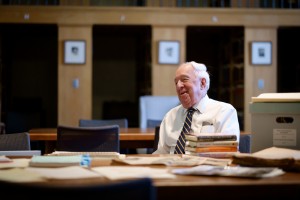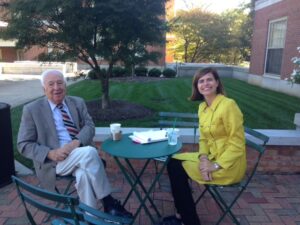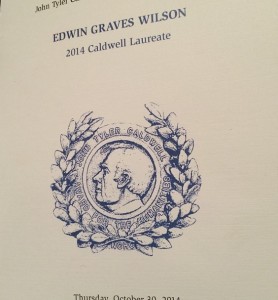For those who are fans of Provost Emeritus Ed Wilson (’43) — and there are legions — you missed a happy gathering of Ed and friends a few weeks ago at the Porter Byrum Welcome Center on campus. You would have had to squeeze in for the event at which the North Carolina Humanities Council bestowed the John Tyler Caldwell Award for the Humanities on the man known as “Mr. Wake Forest.”

The State of North Carolina honored Professor and Provost Emeritus Edwin G. Wilson (’43) for his contributions to the humanities.
“The award recognizes Wilson for his lifelong achievements as an advocate for the public humanities across North Carolina,” according to the council. The Caldwell Award is the council’s highest honor. Wilson joins Caldwell Laureates who have included newsman Charles Kuralt, novelist Reynolds Price, historian John Hope Franklin and Wilson’s wife, poet and author Emily Herring Wilson (MA ’62). In greeting the audience Provost Rogan Kersh (’86) lauded the council’s judges for their “impeccable” judgment and labeled the Wilsons “our nation’s ultimate humanities power couple.”
It was an evening at which Wilson, 91, praised school teachers from his North Carolina hometown by name — from the one who “taught me to write cursively” to the high school teacher who read “line by line” Virgil’s “Aeneid” with Wilson and two other students that year. “Public school teachers are still at the beginnings of all of our various journeys in the humanities, and without them we might well not have come to our own love of literature and language and history,” Wilson said. “We should never fail to honor and reward them.”
He also made clear the heartbreaking absence of one of the devoted friends of the humanities in North Carolina and at Wake Forest: Penelope Niven (’62, D. Litt. ’92). She helped make the case for Wilson to receive the award. “(Her) sudden death almost two months ago leaves us still mourning,” Wilson said. “Penny was a biographer, and she had grace and charm of a rare quality.”
I would be remiss not to mention the stellar introduction of Wilson by his former student, Marybeth Sutton Wallace (’86), who works as special assistant to President Nathan O. Hatch. Her remarks were sharp, wise and funny. I asked her to give me a copy, and despite its length I include it here for posterity. I feel certain the legions of fans of Mr. Wake Forest will recognize themselves in her words and perhaps will share in the celebratory air of an autumn evening. Congratulations, Dr. Wilson.

Dr. Wilson and Marybeth Sutton Wallace, who presented her introduction of him at the Caldwell Award ceremony on Oct. 30. (Photo by Norma-May Isakow)
Wallace: I once tried to explain to a friend why it was students at Wake Forest never wanted to miss one of Professor Edwin G. Wilson’s classes, why it was that at 2:45 pm on a Friday afternoon, a classroom in Tribble, 216-C, was filled from front to back with students thoroughly enchanted, and that except for one deep resonant voice reading “The Song of Wandering Aengus” or “Kubla Khan” not a sound or shuffle could be heard.
“You could have been on your way to the beach — or the mountains,” my friend exclaimed, “or throwing Frisbee on the Quad.”
But how could the beach or mountains compare with the dizzying lake country of Wordsworth’s boyhood, the lush green of Yeats’s Sligo, or the romance of Byron’s Italy, Greece and Spain?
“You just couldn’t skip Dr. Wilson’s class,” I protested, “because you couldn’t bear to disappoint him.” And you couldn’t bear to disappoint yourself either. “Young and easy under the apple boughs,” we had that feeling that what we were learning was nourishing our souls and fortifying us for the years to come.
We left his classroom believing we could be better people. We left his classroom believing we could do something to make the world more beautiful. And we were merely one generation of students that Dr. Wilson touched in a teaching career that spanned more than a half-century.
When I was teaching high school English in Raleigh a fellow teacher at Enloe, Dr. Sally Humble, recalled that same feeling of being swept away by Dr. Wilson’s classes when she was a student at Wake Forest in the early sixties. As she prepared her own lesson on Keats’s “The Eve of St. Agnes” she remembered Dr. Wilson’s riveting lecture, the brilliant imagery, the rich language. She said she must have taken ten pages of notes because the lesson made such a lasting impression. When she gleefully retrieved the dusty notebook from a box buried in the attic, eager to devour her notes and impart this wealth of knowledge to her students, she was stunned to find one sentence under “The Eve of St. Agnes”: Spellbound, she had written simply, “Dr. Wilson read the poem.”
One of the first things Dr. Wilson would do in the course of a semester was to invite each of his students by for an individual conference — just to talk — about hometowns (He loves the names of hometowns), families, favorite books, recent movies, plays — on Broadway or at the Stevens Center — perhaps even ACC basketball or Eastern North Carolina barbecue.
What struck you most in these conferences is what an attentive and interested listener he was, and how he would remember these things about you which you told him, each time you saw him. Later in the semester you would be invited to his & Emily’s home on Timberlake Lane for supper, where surrounded by rows and walls of beloved books, you might look at slides from Ireland or take an oral part in Yeats’s “Cathleen ni Houlihan.”
Ed Southern (’94) wrote an article in his student days for the Old Gold & Black newspaper paying tribute to Ed Wilson when the Wilson Wing of Z. Smith Reynolds Library was named for him in 1992. He recalls professor Bynum Shaw, who had been on the Old Campus with Wilson, saying of his classmate: “the root of it all is his great humanity.”
Now Executive Director of the North Carolina Writers’ Network, Southern says of his former teacher: “To connect so deeply with Wordsworth, Blake, Keats, or Yeats is rare. To connect so deeply with hundreds, thousands, of people, at Wake Forest and around the world, is rarer still. I don’t know anyone else who can do both. I’d be willing to bet serious money that he is the most humble, down-to-earth person ever to have a building named after him.”
Dr. Wilson came to Wake Forest College at the age of 16 by way of Leaksville, North Carolina, the youngest of five children, a first-generation college student. He has referred to that time as “the start of a beautiful friendship,” echoing words from one of his all-time favorite films, “Casablanca.” In 1943 he graduated summa cum laude and spent three years as a Naval officer on a destroyer escort in the Pacific.
“I’ve always been a Romantic, and I’ve always loved stories of the sea,” he told students in Jenny Puckett’s History of Wake Forest class. “I had never been in the ocean; I had never even been in a row boat, but the idea of going into the Navy had a romantic appeal to me.” Upon his return, he applied to graduate school, but while awaiting a response he got a fateful call from one of his much admired professors, Broadus Jones, asking him to teach freshman English for a year — and being a dutiful son of his alma mater, he agreed.
The next day he received his letter of acceptance from Columbia: Fortunately for Wake Forest and for his home state, he had already committed to teaching … and for the next six decades — with the exception of a few years at Harvard, earning his doctorate in English, he would be all ours.
In the early 1960s Dr. Wilson chaired the faculty committee that voted to end racial segregation at Wake Forest, and Ed Reynolds enrolled as the first black student in 1962. He helped establish the University’s first residential study-abroad programs in Venice and London. Always an admirer of Irish poetry and the Irish people, he helped to found the Wake Forest University Press in the mid-1970s, now the premier publisher of Irish poetry in North America. He shaped the academic curriculum, programs, and faculty at a critical time in Wake Forest’s history.
Ever gracious and generous, he never came back to the Provost’s Office on a Friday afternoon after class with an ice-cream cone in hand without insisting that all the rest of us working in the Provost’s Office have an ice-cream cone too … one of many “little, nameless unremembered acts of kindness and of love.”
Dr. Wilson is married to Emily Herring Wilson, poet, author, and Caldwell Laureate herself. They have three children: Ed, a superior court judge in Rockingham County; Sally, executive director of Project Access in Durham, which provides access to health care for low-income patients; and Julie, Director of the Writing Center at Warren Wilson college in Swannanoa, as well as four much-adored grandchildren: Buddy, Harry, Maria, and Ellie.
His life has been anchored at Wake Forest but Ed Wilson’s life’s work has extended to every town across this state, every corner of the country, and beyond as his students everywhere, with the force of Shelley’s West Wind, carry forward that torch for the Humanities, that acknowledgment that we are more alike than we are different. He showed us that in the most difficult times in our lives, “all hatred driven hence, the soul recovers radical innocence … and that we can “though every face should scowl and every windy quarter howl, or every bellows burst, be happy still.”
I am deeply honored to present to you the 2014 Caldwell Award Laureate, my teacher, our teacher, a man who taught us to see the “world in a grain of sand,” Ed Wilson.

